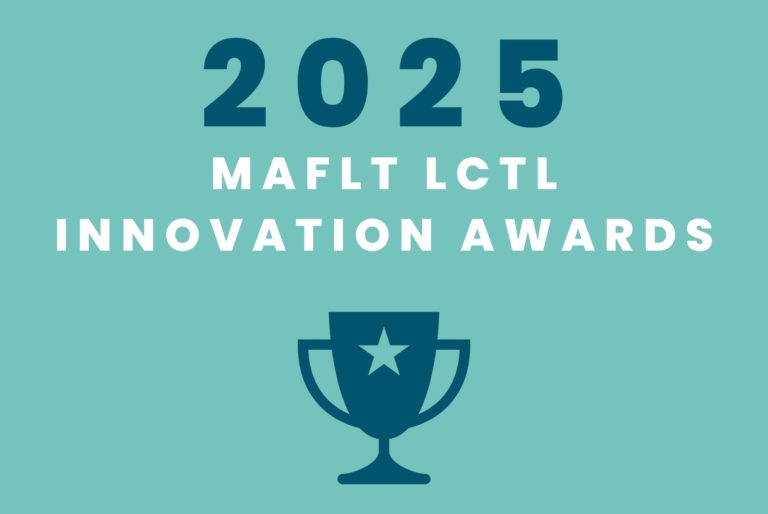Announcing the 2023 MAFLT LCTL Awards
The NLRC is excited to announce the 2023 MAFLT LCTL Innovation Award winners!
The NLRC gives these awards to recognize outstanding innovations in LCTL instruction. These innovations use technology to creatively and effectively address a real, context-based problem in LCTL education. Award winners use technology to transform traditional teaching practices, prompting learners to explore, create, and develop proficiency with language through accessible technology. These awards are generously sponsored by the Masters in Foreign Language Teaching at Michigan State University.
The Best Innovation Award goes to Jingjing Ji, an instructor of Chinese at Northwestern University. Jingjing used Perusall, an online social annotation tool, to engage beginning learners of Chinese in meaningful discussion of multimodal content. Jingjing’s materials show how she effectively employed technology to allow an active exchange between novice users of Chinese, as well as adapt instruction to students’ needs and interests. Well done, Jingjing, and congratulations!
Jingjing Ji demonstrates the value of social annotation tools for engaging beginning learners of Chinese. You can also view the video here.
Two runners up demonstrated meaningful innovation in open instructional resources (OERs) and classroom innovations.
The Best OER Award goes to Eduardo Viana da Silva, an instructor of Portuguese at the University of Washington. Eduardo collaborated with several colleagues in the US and internationally to create a digital open access textbook for Portuguese. The book, Bate-Papo: An Introduction to Portuguese, uses videos, audio recordings, labeled images, and open-access licensing. Eduardo and colleagues’ efforts are an important step in making quality LCTL education materials adaptable and accessible. Congratulations, Eduardo!
Eduardo Viana da Silva gives a tour of the OER Portuguese textbook Bate-Papo: An Introduction to Portuguese. You can also view the video here.
The Best Classroom Innovation Award goes to Min-Min Liang, an instructor of Chinese at MIT. Min-Min used Book Creator to reconceptualize a project in which students learn the Chinese characters for their names. The new project involves graphic design, written and spoken Chinese language proficiency, creativity, new cultural knowledge, and peer feedback. Min-Min’s innovation is a great example of how technology can be used as a starting point for meaningful interaction in and about LCTLs. Congratulations, Min-Min!
Min-Min Liang shows how learners of Chinese connect language skills and cultural knowledge in a project on their Chinese names. You can also view the video here.
In addition to the winners, a number of submissions deserve Honorable Mention for using technology in a variety of innovative ways to enhance LCTL instruction.
OER Honorable Mention
Jeannette Okur, who teaches Turkish at University of Texas at Austin, has worked with colleagues to design, create, and disseminate an OER textbook for Turkish, Her Şey Bir Merhaba ile Başlar. This well-organized, accessible, and adaptable OER is a strong addition to resources for learning Turkish.
Jeannette Okur introduces the OER Turkish textbook . You can also view the video here.
Classroom Innovation Honorable Mention
Kristin Bidoshi, an instructor of Russian at Union College, has collaborated with colleagues on a VR game to teach verbs of motion in Russian. The concept of Поехали! (Let’s go!) can be made accessible to a wide range of learners, as well as adapted for other languages.
Preview the VR experience in Поехали!, a game that takes learners of Russian to destinations on and around the Union College campus. You can also view the video here.
Congratulations to all the MAFLT LCTL Innovation Award winners and honorable mentions! Keep an eye out for next year’s award call on the NLRC newsletter, Facebook, or Twitter!


